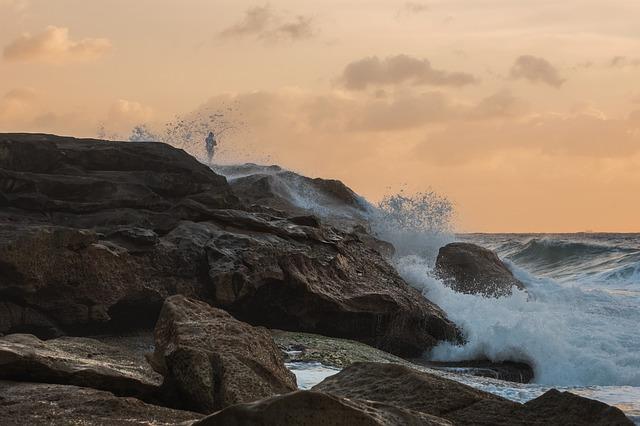Hard times in Australian strategic thinking
Posted By Rod Lyon on October 19, 2018 @ 06:00

Australia has long been ‘the lucky country’—basking in endless beaches, summer barbecues, democratic government, and mineral wealth. It’s also been lucky in terms of its strategic policy, able to ride the coat-tails of a global and regional order forged mainly along the Eurasian rimlands [1]. That order ensured Australian security was largely achieved at a distance from its shores, and through a set of arrangements engaging other, stronger Western nations as principal players. True, that occasionally left Australian strategic thinkers stroking their chins and contemplating the relative attractions of ‘forward defence’ versus ‘continental defence’, but that was a luxury countries along the rimlands never had.
The recent joint presentation [2] at the Australian National University by three former senior defence officials (Paul Dibb, Richard Brabin-Smith and Brendan Sargeant)—exploring the question of whether it’s time for a radical shift in Australian defence policy—highlights just how much the ground has shifted. Key assumptions underpinning Australia’s traditional strategic settings have been called into question by the simultaneous empowerment of a range of authoritarian challengers to the existing regional security architecture and the Trump administration’s faltering sense of commitment to that architecture. Strategic competition has moved beyond the rimlands.
So far, 2018 has been a difficult year in Australian strategic thinking. Government, in private, and analysts, more publicly, have begun to speculate on what Australia’s ‘Plan B [3]’ might look like in the event that the ANZUS alliance suddenly becomes less reliable than it has been in the past. In previous years, it has been relatively common to depict the alliance as the central pillar of Australia’s security. Even the idea that Australia might pursue a policy of defence self-reliance typically turns upon an ADF enabled and supported by US high-technology kit, US intelligence, US training and exercising, and privileged access to US logistics stores in time of crisis.
So finding a viable Plan B involves some heavy lifting. Some, indeed, say there is no Plan B; others that Plan B is to find a way back to Plan A. I don’t think that’s entirely true, despite Canberra’s deep attachment to ANZUS. Peter Jennings’ list of 10 projects [4] that an Australian government might pursue to strengthen its regional and national capabilities shows there are options for Australia even in a post-US Asia.
But Plan B has to be more than a muscled-up ADF, for the simple reason that strategic interests are broader than defence interests. A threat to a country’s homeland is typically the last threat to its security, not the first. We want a Plan B that gives us options at an earlier stage as security threats begin to develop.
In essence, that means we want a policy that looks upstream rather than just downstream. Looking upstream means we want to be shapers of our world and not just passive inheritors of a strategic order shaped by others. True, as Anthony Milner has cautioned, we need to be hard-headed [5] in imagining the level of shaping we can do: Asian countries are not about to embark on a wave of alliance-building, either with Australia or each other. Indeed, the region is entering a period of unsettling strategic volatility as Asian great powers start to assume more prominent roles in a—shifting—regional order. Several Asian countries are enjoying a new-found capacity to do some shaping of their own.
Still, the principal guide to Australia’s shaping efforts should be our own strategic objectives. Despite the current disorder in global and regional affairs, those haven’t changed. What Australians want today is the same thing we have wanted for decades: a secure, liberal, prosperous Australia in a secure, liberal, prosperous world.
Our dominant mechanism for pursuing that goal has been maintaining a close strategic partnership with the dominant Western maritime power of the day. But we need to face facts: the coming world is one where Western clout will be felt less. So we will need to be more strategically promiscuous in finding partners for the future, even while admitting to ourselves that the level of overlapping shared interests might not be as great as was the case with ANZUS.
How should we prioritise those overlapping interests? Well, each of the three adjectives in our strategic goal—secure, liberal, prosperous—is important to us. A secure Australia is one where we don’t live under the coercive shadow of a great regional power. A liberal Australia is one where we take the core tenets of democracy and human rights as articles of faith. A prosperous Australia is one where its people aren’t obliged to live in sackcloth and ashes. Moreover, we want to see a world where similar aspirations enjoy widespread support in other countries.
Because all three adjectives are important, our strategic loyalty does not automatically default to whichever great power promises us affluence.
So, yes, we should be thinking about our strategic future. A stronger defence force is a necessary, but not sufficient, condition for achieving the sort of world we want. Partnerships have in the past been central to our strategic success. They will remain so as we go forward. But they must be partnerships we have chosen because they contribute to our objectives. Statecraft will be key here, not just military force.
Article printed from The Strategist: https://aspistrategist.ru
URL to article: /hard-times-in-australian-strategic-thinking/
URLs in this post:
[1] rimlands: http://sfppr.org/2017/02/the-return-of-mahan-mackinder-and-spykman/
[2] joint presentation: http://www.anu.edu.au/events/why-australia-needs-a-radically-new-defence-policy
[3] Plan B: /dinkus/australias-security-a-plan-b/
[4] list of 10 projects: /with-trump-at-large-australia-needs-a-plan-b-for-defence/
[5] hard-headed: /australias-plan-b-time-for-some-tough-realism/
Click here to print.